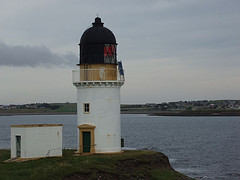Placed at the beginning of winter, many pagan fertility and light celebrations are connected with this holiday, such as the Martin's fires (bon fires and burning wheels,) and the Martin's singing. When evening falls children, carrying Martin's lanterns and torches, parade through the streets. While parading they sing about the generosity of St. Martin and the procession may end with the lighting of a bonfire. Finally the children go from house to house and recite verses, for which they are rewarded with sweets or, more so these days, with money. In some areas the legend is reenacted in which St. Martin shares his cloak with a beggar in the cold of winter.
The real reason that the geese are butchered around St. Martin's Day
is that they are ready for harvesting at this time of the year. In
this country as well as in the old, goose feathers were used for
pillows and featherbeds, quills were used for writing, the eggs were
good for baking, the fat was needed for baking and could be eaten on
bread, the bird made a great roast and even the wing could be used
for dusting.
In England, the day was called Martinmas (or sometimes Martlemass). Martlemass beef was beef from cattle slaughtered at Martinmas and salted or otherwise preserved for the winter.
In Scotland, Martinmas was one of the four Quarter Days in the year. Apart from November 11th, there was Candlemas (February 2nd), Whitsun (late May / early June) and Lammas (August 1st). Quarter Days would divide the legal year, when rent and interest on loans were due, and when servants were hired and paid. These would also be the days that contracts and leases would commence and cease.













Very interesting! Thank you. - Barbara
ReplyDeleteA little jar of goose grease was kept in the cupboard when I was small and rubbed on the chest ,for bad coughs ,and yes my Granny made feather pillows and Bolsters and mattresses/beds. I had forgotten about all that ,thanks for ableing me to record that memory....love Jan xx
ReplyDeleteThanks for mentioning St. Martin de Tours, this was one catechumen who I always felt antagonistic about because although he was exceptionally pious all this long life, he was responsible for the destruction of many beautiful temples which he immediately turned into Christian churches, so we'll never know how much archaeological history we've lost. Still, one could do worse than see life as he did, a truly kind generous man. CATHY
ReplyDeleteDear Guiod
ReplyDeletevery interesting!thanks! I never knew about this "holiday"! did people ever get off from work or anything like that? did they actually celebrate this?
natalie
oh Guido
ReplyDeletethank you too for the beautiful graphic! lovely
natalie